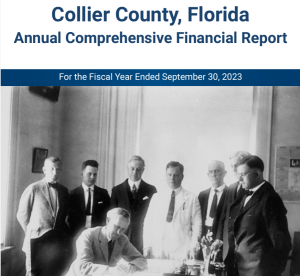 Like any large business, Collier County has a fiscal year-end and must close its books and report its financial condition annually. The fiscal year for county government begins October 1st and ends September 30th of the subsequent year. In Collier County, the day-to-day accounting and annual financial reporting is the responsibility of the Collier County Clerk of the Circuit Court and Comptroller. The closing of the books for Collier County is a five (5) or six (6) month process culminating in the issuance of the Annual Comprehensive Financial Report (ACFR). Pursuant to Florida law, the ACFR must be audited by an independent certified public accountant (most recently Clifton Larsen Allen (CLA)). This financial audit, including the auditor’s opinion on the financial statements, must be filed with the Florida Auditor General by June 30 of the subsequent year. The ACFR consolidates the financial activities of the Board of County Commissioners, the Clerk of the Circuit Court and Comptroller, the Sheriff, the Tax Collector, the Property Appraiser, and the Supervisor of Elections.
Like any large business, Collier County has a fiscal year-end and must close its books and report its financial condition annually. The fiscal year for county government begins October 1st and ends September 30th of the subsequent year. In Collier County, the day-to-day accounting and annual financial reporting is the responsibility of the Collier County Clerk of the Circuit Court and Comptroller. The closing of the books for Collier County is a five (5) or six (6) month process culminating in the issuance of the Annual Comprehensive Financial Report (ACFR). Pursuant to Florida law, the ACFR must be audited by an independent certified public accountant (most recently Clifton Larsen Allen (CLA)). This financial audit, including the auditor’s opinion on the financial statements, must be filed with the Florida Auditor General by June 30 of the subsequent year. The ACFR consolidates the financial activities of the Board of County Commissioners, the Clerk of the Circuit Court and Comptroller, the Sheriff, the Tax Collector, the Property Appraiser, and the Supervisor of Elections.
With a current budget of $2B the closing of the underlying accounting records is a significant undertaking requiring hundreds of hours of work and cooperation between the Clerk and Comptroller’s office and county departments, as well as the constitutional offices of the Sheriff, Tax Collector, Property Appraiser and Supervisor of Elections. The County provides citizens a wide range of services that include tax assessment and collections, law enforcement, emergency management, fire and emergency medical services, animal services, library, museum and cultural services, parks and recreation operations, road maintenance and construction, economic development, and social and human services. Additionally, the County owns and operates a water and wastewater utility, a solid waste landfill and recycling program, a landfill gas-to-energy facility, three airports, a transit system, and an amateur sports complex.
Accountability is the paramount objective of governmental financial reporting. The government’s duty to be accountable includes providing financial information that is useful for economic, social, and political decisions. Financial reports that contribute to these decisions include information useful for comparing actual financial results with the legally adopted budget, assessing financial condition and results of operations, assisting in determining compliance with finance-related laws, rules, and regulations, and assisting in evaluating efficiency and effectiveness.
Accounting rules for governments, including counties, are promulgated by the Governmental Accounting Standards Board of the Financial Accounting Foundation. These rules require that financial information be reported in two major activity categories, governmental and business-type, on an entity-wide basis, as well as on a fund-by-fund basis. The governmental and business-type activities are reported on a full accrual basis, and the individual fund information is reported on a modified accrual basis for certain funds and a full accrual basis for others.
For further information please visit our website at collierclerk.com for the complete FY 2023 Annual Comprehensive Annual Financial Report or our recently published FY 2023 Popular Annual Financial Report (PAFR). The PAFR offers a more condensed version of the Annual Comprehensive Annual Report, designed to be more readable.

